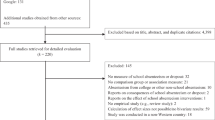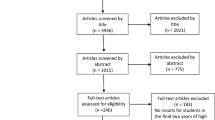Abstract
School attendance problems imply a serious threat to a child’s academic, social and emotional development. The aim of this study was to validate the Spanish version of the School Refusal Assessment Scale-Revised (SRAS-R) in Ecuadorian adolescents. Participants were 1786 students (51% boys) aged 15 to 18 years (M = 16.31; SD = 1.01) randomly selected from 12 high schools located in different geographic zones of Quito (Ecuador). The measures used were the SRAS-R, the Social Anxiety Scale for Adolescents, the Depression Anxiety Stress Scale-21 and the School Anxiety Inventory. Results supported the four-factor structure (I. Avoidance of Negative Affectivity, II. Escape from Social and/or Evaluative situations, III. Pursuit of Attention and IV. Pursuit of Tangible Reinforcement). This model remained invariant across gender and age and adequate levels of internal consistency were obtained for the factors (.77, .81, .75 and .71). Girls reported higher levels of Escaping from Social Evaluation than boys, and boys reported higher levels of Pursuing Tangible Reinforcements than girls. The oldest students (17–18 years) scored higher on Avoiding Negative Affectivity and Escape from Social or Evaluation situations than the younger students. Discriminant validity was examined and significant correlations with other measures were found. These findings provide initial support for the use of the SRAS-R as a measure to assess school refusal in Ecuadorian adolescents.
Similar content being viewed by others
References
Balfanz, R., & Byrnes, V. (2012). Chronic absenteeism: Summarizing what we know from nationally available data. Baltimore: Johns Hopkins University Center for Social Organization of Schools.
Barry, A. E., Chaney, B., & Chaney, D. (2010). The impact of truant and alcohol-related behaviour on educational aspirations: A study of US high school senior. Journal of School Health, 81(8), 485–492. https://doi.org/10.1111/j.1746-1561.2011.00618.x.
Bentaouet-Kattan, R., & Székely, M. (2015). Analyzing the dynamics of school dropout in upper secondary education in Latin America. Policy Research Working, 7223, 1–32.
Brandibas, G., Jeunier, B., Clanet, C., & Fouraste, R. (2004). Truancy, school refusal and anxiety. School Psychology International, 25(1), 117–126. https://doi.org/10.1177/0143034304036299.
Christogiorgos, S., & Giannakopoulos, G. (2014). School refusal and the parent-child relationship: A psychodynamic perspective. Journal of Infant, Child and Adolescent Psychotherapy, 13(3), 182–192. https://doi.org/10.1080/15289168.2014.937976.
Cohen, J. (1988). Statistical power analysis for the behavioral sciences (2nd ed.). Hillsdale, NJ: Erlbaum.
Costello, E. J., Mustillo, S., Erkanli, A., Keeler, G., & Angold, A. (2003). Prevalence and devolpment of psychiatric disorders in childhood and adolescence. Archives of General Psychiatry, 60(8), 837–844. https://doi.org/10.1001/archpsyc.60.8.837.
Duchesne, S., & Ratelle, C. F. (2016). Patterns of anxiety symptoms during adolescence: Gender differences and sociomotivational factors. Journal of Applied Developmental Psychology, 16, 41–50. https://doi.org/10.1016/j.appdev.2016.07.001.
Eicher, V., Starklé, C., & Cleménce, A. (2014). I want to quit education: A longitudinal as stress and optimism as predictors of school dropout intention. Journal of Adolescence, 37(7), 1021–1030. https://doi.org/10.1016/j.adolescence.2014.07.007.
Fonseca, E., Paino, M., Lemos, S., & Muñiz, J. (2010). Psychometric properties of the depression anxiety and stress Scales-21 (DASS-21) in Spanish college students. Revista Ansiedad y Estrés, 16(2–3), 215–226.
Fremont, W. P. (2003). School refusal in children and adolescents. American Family Physician, 68(8), 1555–1561.
García-Fernández, J. M., Inglés, C. J., Martínez-Monteagudo, M. C., Marzo, J. C., & Estévez, E. (2011). Inventario de ansiedad escolar: Validación en una muestra de estudiantes de educación secundaria [School Anxiety Inventory: Validation in a sample of secondary school students]. Psicothema, 23(2), 301–307.
García-Fernández, J. M., Inglés, C. J., Gonzálvez, C., Vicent, M., Delgado, B., & Gómez-Núñez, M. I. (2016). Revisión bibliométrica del rechazo escolar: Perspectivas de investigación y su análisis [bibliometric review of school refusal: Research perspectives and their analysis]. Educatio Siglo XXI, 34(1), 71–92. https://doi.org/10.6018/j/252541.
Gonzálvez, C., Inglés, C. J., Kearney, C. A., Vicent, M., Sanmartín, R., & García-Fernández, J. M. (2016). School refusal assessment scale-revised: Factorial invariance and latent means differences across gender and age in Spanish children. Frontiers in Psychology, 7, 1–10. https://doi.org/10.3389/fpsyg.2016.02011.
Gosch, E. A., Flannery-Schroeder, E., & Brecher, R. J. (2012). Anxiety disorders school-based cognitive-behavioral interventions. In R. B. Mennutti, A. Freeman, & R. W. Christner (Eds.), Cognitive-behavioral interventions in educational settings: A handbook for practice (pp. 117–160). New York, NY: Taylor & Francis.
Haight, C., Kearney, C. A., Hendron, M., & Schafer, R. (2011). Confirmatory analyses of the school refusal assessment scale- revised: Replication and extension to a truancy sample. Journal Psychopatholoy and Behavioral Assessment, 33(2), 196–204. https://doi.org/10.1007/s10862-011-9218-9.
Hancock, K. J., Gottfried, M. A., & Zubrick, S. R. (2018). Does the reason matter? How student-reported reasons for school absence contribute to differences in achievement outcomes among 14-15 year olds. Bristish Educational Research Journal, 44(1), 141–174. https://doi.org/10.1002/berj.3322.
Heyne, D., Vreeke, L. J., Maric, M., Boelens, H., & Van Widenfelt, B. M. (2016). Functional assessment of school attendance problems: An adapted version of the school refusal assessment scale–revised. Journal of Emotional and Behavioral Disorders, 25, 1–15. https://doi.org/10.1177/1063426616661701.
Higa, C. K., Daleiden, E. L., & Chorpita, B. F. (2002). Psychometric properties and clinical utility of the school refusal assessment scale in a multiethnic sample. Journal of Psychopathology and Behavioral Assessment, 24(4), 247–258. https://doi.org/10.1023/A:1020727016113.
Inglés, C. J., La Greca, A. M., Marzo, J. C., García-López, L. J., & García-Fernández, J. M. (2010). Social anxiety scale for adolescents: Factorial invariance and latent means differences across gender and ages in Spanish adolescents. Journal of Anxiety Disorders, 24, 847–855. https://doi.org/10.1016/j.janxdis.2010.06.007.
Inglés, C. J., Gonzálvez, C., García-Fernández, J. M., Vicent, M., & Martínez-Monteagudo, M. C. (2015). Current status of research on school refusal. European Journal of Education and Psychology, 8(1), 39–54.
Kearney, C. A. (2001). School refusal behavior in youth: A functional approach to assessment and treatment. Washington, DC: American Psychological Association.
Kearney, C. A. (2002). Identifying the function of school refusal behavior: A revision of the school refusal assessment scale. Journal of Psychopathology and Behavioral Assessment, 24(4), 235–245. https://doi.org/10.1023/A:1020774932043.
Kearney, C. A. (2006). Confirmatory factor analysis of the school refusal assessment scale–revised: Child and parent versions. Journal of Psychopathology and Behavioral Assessment, 28(3), 139–144. https://doi.org/10.1007/s10862-005-9005-6.
Kearney, C. A. (2007). Getting your child to say yes to school. New York: Oxford University Press.
Kearney, C. A. (2008). School absenteeism and school refusal behavior in youth: A contemporary review. Clinical Psychology Review, 28(3), 451–471. https://doi.org/10.1016/j.cpr.2007.07.012.
Kearney, C. A. (2016). Managing school absenteeism at multiple tiers: An evidence-based and practical guide for professionals. New York: Oxford University Press.
Kearney, C. A., & Albano, A. (2004). The functional profiles of school refusal behavior: Diagnostic aspects. Behavior Modification, 28(1), 147–161. https://doi.org/10.1177/01454455033259263.
Kearney, C. A., & Bates, M. (2005). Addressing school refusal behavior: Suggestions for frontline professionals. Children and Schools, 27(4), 207–216. https://doi.org/10.1093/cs/27.4.207.
Kearney, C. A., & Silverman, W. K. (1993). Measuring the function of school refusal behavior: The school refusal assessment scale. Journal of Clinical Child Psychology, 22(1), 85–96. https://doi.org/10.1207/s15374424jccp2201_9.
Kearney, C. A., & Spear, M. (2014). School refusal behavior. In L. Grossman & S. Walfish (Eds.), Translating psychological research into practice (pp. 83–85). Washington, DC: American Psychological Association.
Kearney, C. A., Pursell, C., & Álvarez, K. (2001). Treatment of school refusal behavior in children with mixed functional profiles. Cognitve and Behavioral Practice, 8(1), 3–11. https://doi.org/10.1016/S1077-7229(01)80037-7.
Kearney, C. A., Chapman, G., & Cook, L. C. (2005). School refusal behavior in young children. International Journal of Behavioral Consultation and Therapy, 1(3), 212–218. https://doi.org/10.1037/h0100746.
Kendall, A. D., Zinbarg, R. E., Bobova, L., Mineka, S., Revelle, W., Prenoveau, J. M., & Craske, M. G. (2016). Measuring positive emotion with the mood and anxiety symptom questionnaire: Psychometric properties of the anhedonic depression scale. Assessment, 23(1), 86–95. https://doi.org/10.1177/1073191115569528.
King, N. J., Ollendick, T. H., & Tonge, B. J. (1995). School refusal: Assessment and treatment. Boston, MA: Allyn & Bacon.
La Greca, A. M., & López, N. (1998). Social anxiety among adolescents: Linkages with peer relations and friendships. Journal of Abnormal Child Psychology, 26(2), 83–94. https://doi.org/10.1023/A:1022684520514.
Lovibond, S. H., & Lovibond, P. F. (1995). Manual for the depression anxiety stress scales. Sydney: Psychology Foundation.
Lowe, P. (2015). The revised Children’s manifest anxiety scale-second edition short form. Journal of Psychoeducational Assessment, 33(8), 719–730.
Lyon, A. R. (2010). Confirmatory factor analysis of the school refusal assessment scale-revised in an African American community sample. Journal of Psychoeducational Assessment, 28(6), 511–523. https://doi.org/10.1177/0734282909353438.
Maynard, B. R., Salas-Wright, C. P., Vaughn, M. G., & Peters, K. E. (2012). Who are truant youth? Examining distinctive profiles of truant youth using latent profile analysis. Journal of Youth and Adolescence, 41(12), 1671–1684. https://doi.org/10.1007/s10964-012-9788-1.
Nelemans, S. A., Halle, W. W., Branje, S. J., Raaijmakers, Q. A. W., Van Lier, P. A. V., & Meeus, W. H. J. (2014). Heterogeneity in development of adolescent anxiety disorder symptoms in an 8-year longitudinal community study. Development and Psychopathology, 26(1), 181–202. https://doi.org/10.1017/S0954579413000503.
Pina, A. A., Zerr, A. A., Gonzales, N. A., & Ortiz, C. D. (2009). Psychosocial interventions for school refusal behavior in children and adolescents. Child Development Perspectives, 3(1), 11–20. https://doi.org/10.1111/j.1750-8606.2008.00070.x.
Richards, H. J., & Hadwin, J. A. (2011). An exploration of the relationship between trait anxiety and school attendance in young people. School Mental Health, 3(4), 236–244. https://doi.org/10.1007/s12310-011-9054-9.
Samuel, D. B., South, S. C., & Griffin, S. A. (2015). Factorial invariance of the five-factor model rating form across gender. Assessment, 22, 65–75. https://doi.org/10.1177/1073191114536772.
Schuch, J. J. J., Roest, A. M., Nolen, W. A., Penninx, B. W. J. H., & de Jonge, P. (2014). Gender differences in major depressive disorder: Results from the Netherlands study of depression and anxiety. Journal of Affective Disorders, 156(1), 156–163. https://doi.org/10.1016/j.jad.2013.12.011.
Seçer, I. (2014). The adaptation of school refusal assessment scale into Turkish: Reliability and validity studies. Pakistan Journal of Statistics, 30(6), 1197–1202.
Thornton, M., Darmody, M., & McCoy, S. (2013). Persistent absenteeism among Irish primary school pupils. Educational Review, 65(4), 488–501. https://doi.org/10.1080/00131911.2013.768599.
Tsaousis, I., & Kazi, S. (2013). Factorial invariance and latent mean differences of scores on trait emotional intelligence across gender and age. Personality and Individual Differences, 54, 169–173. https://doi.org/10.1016/j.paid.2012.08.016.
Tucker, L. R. (1987). Delovelopments in classical item analysis methods. ETS Research Reports Series, 1987(2), 1–191. https://doi.org/10.1002/j.2330-8516.1987.tb00250.x.
Walter, D., Bialy, J. V., Wirth, E. V., & Doepfner, M. (2017). Psychometric properties of the German school refusal assessment scale-revised. Journal of Psychoeducational Assessment, 1–5. https://doi.org/10.1177/0734282916689641.
Wijetunge, G. S. y Lakmini, W. D. (2011). School refusal in children and adolescents. Journal of Child. Health, 40(3), 128–131. https://doi.org/10.4038/sljch.v40i3.3511.
Xu, Y., Schneier, F., Heimberg, R. G., Princisvalle, K., Liebowitz, M. R., Wang, S., & Blanco, C. (2012). Gender differences in social anxiety disorder: Results from the national epidemiologic sample on alcohol and related conditions. Journal of Anxiety Disorders, 26(1), 12–19. https://doi.org/10.1016/j.janxdis.2011.08.006.
Yahaya, A., Ramli, J., Hashim, S., Ibrahim, M. A., Kadir, H. B. H., Boon, Y., & Rahman, R. R. R. (2010). The effects of various modes of absenteeism problem in school on the academic performance of students in secondary schools. European Journal of Social Sciences, 12(4), 624–639.
Funding
This work was supported by the University of Alicante [UA FPU, 2015–5995] granted to Ricardo Sanmartín.
Author information
Authors and Affiliations
Corresponding author
Ethics declarations
Ethical Approval
All procedures performed in studies involving human participants were in accordance with the ethical standards of the institutional and/or national research committee and with the 1964 Helsinki declaration and its later amendments or comparable ethical standards.
Conflict of Interest
On behalf of all authors, the corresponding author states that there is no conflict of interest.
Informed Consent
Informed consent was obtained from all individual participants included in the study.
Rights and permissions
About this article
Cite this article
Gonzálvez, C., Inglés, C.J., Sanmartín, R. et al. Testing factorial invariance and latent means differences of the school refusal assessment scale-revised in Ecuadorian adolescents. Curr Psychol 39, 1715–1724 (2020). https://doi.org/10.1007/s12144-018-9871-1
Published:
Issue Date:
DOI: https://doi.org/10.1007/s12144-018-9871-1




